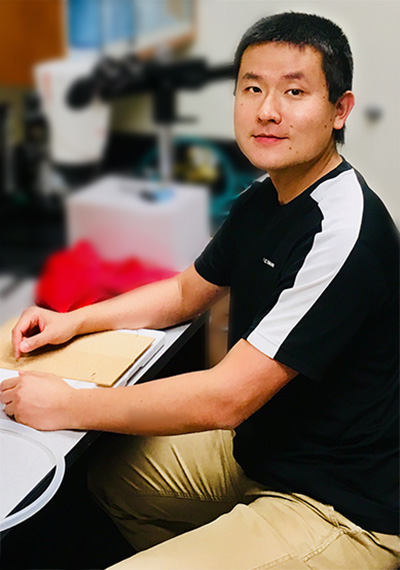Research Focus On Dr. Ge Tao
Dr. Ge Tao, assistant professor in the Medical University of South Carolina, is a new hire in Thrust 3 of MADE in SC. The Tao lab is dedicated to unveiling the cellular and molecular mechanisms underlying myocardial homeostasis, injury, and repair.
Cardiovascular disease is the #1 killer worldwide, with heart failure as the most devastating consequence that accounts for the high mortality. The hallmark of a failing heart is degenerative muscle that gradually loses healthy cardiomyocytes and contractility. Currently, there is no cure to reverse the pathological process. To repopulate a failing myocardium, one promising strategy is to reintroduce cardiomyocytes into cell cycle, which they exit right after birth. Over the past 5 years, Dr. Tao and his colleagues have been focusing on identifying what the young mammalian hearts have and the adult hearts don’t. It turned out that certain molecular pathways, such as the Pitx2 signaling, are enriched in neonatal hearts, and grant them regenerative abilities. The same pathways, when genetically modified, can improve cardiac function and structure repair in adult hearts.
Dr. Tao is currently focusing on screening for more effective healing factors (protein targets). The technical strategies in the Tao lab typically start with unbiased screening based on CRISPR technology and Next Generation Sequencing. Once a target pathway has been identified, it will be validated in cell lines and tissue samples with molecular biology and biochemical experiments. Eventually, each hypothesis will be examined using an adult murine cardiac survival surgery model, where artificial myocardial infarction is induced by occluding the left anterior descending coronary artery. The effect of gene manipulation on the scarring and recovering of the myocardium will be assessed by non-invasive echocardiography, histology, immunofluorescence, and biochemistry. With all the effort, Dr. Tao hopes to understand how developmental pathways are connected to adult heart regeneration and providing novel strategies for treating heart failure caused by myocardial infarction.
As the cell biologist in the Thrust 3-Biomaterials team, Dr. Tao’s role also includes testing the interaction between cultured cells and biomaterials. The information obtained will provide guidelines for future design of biomaterials.
July 12, 2018